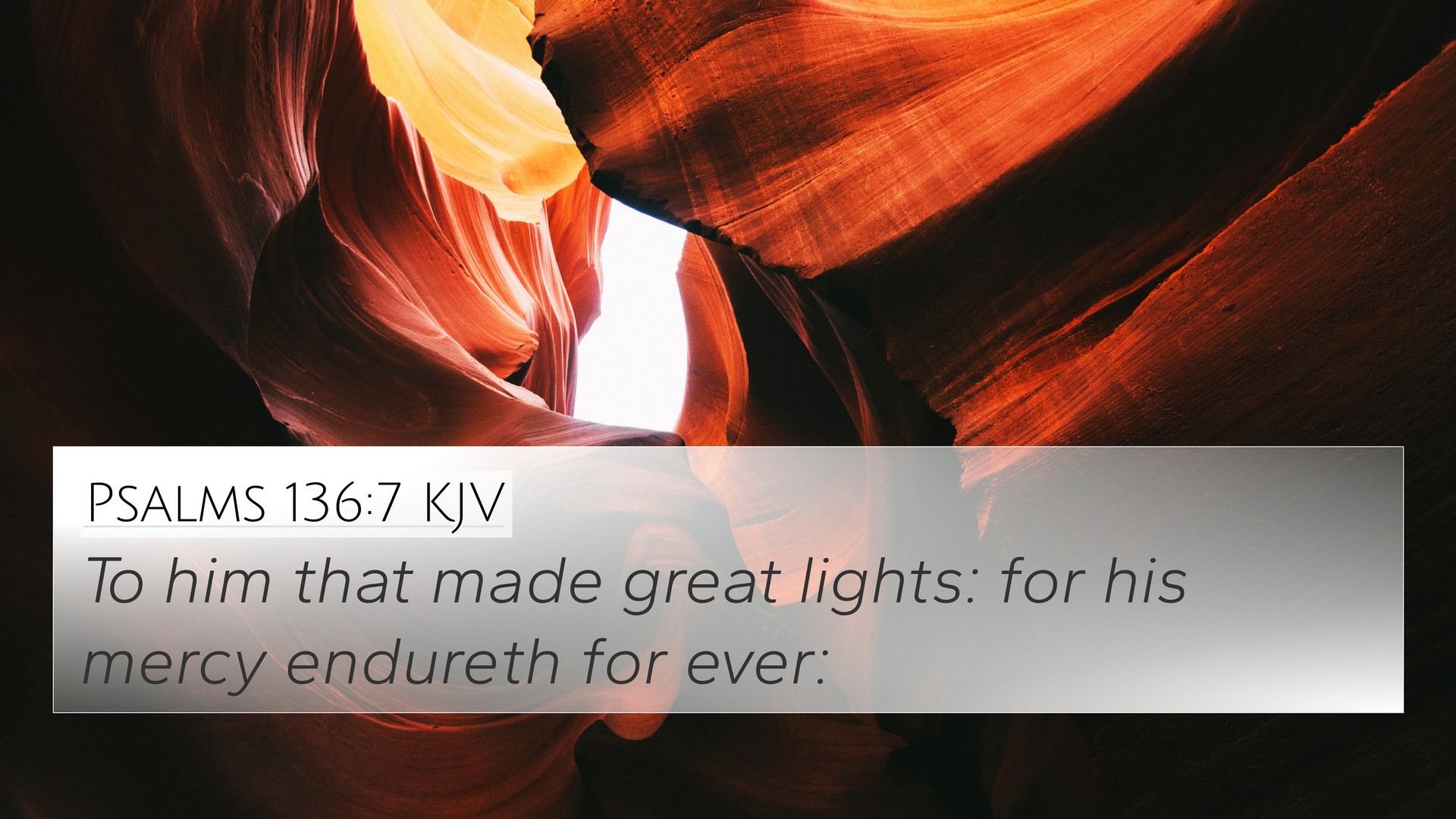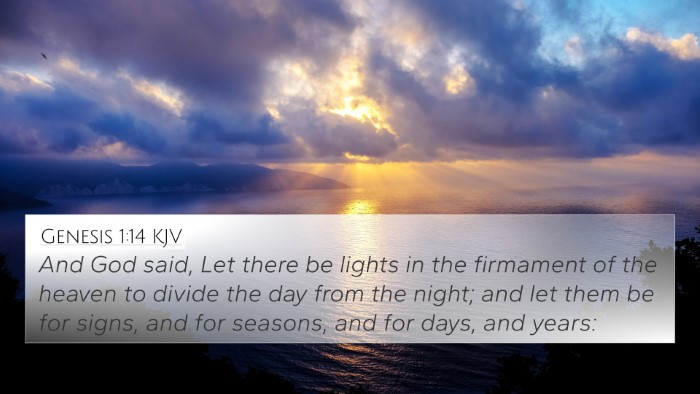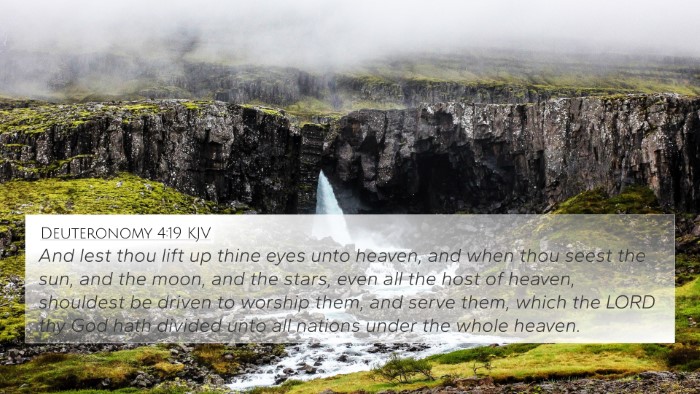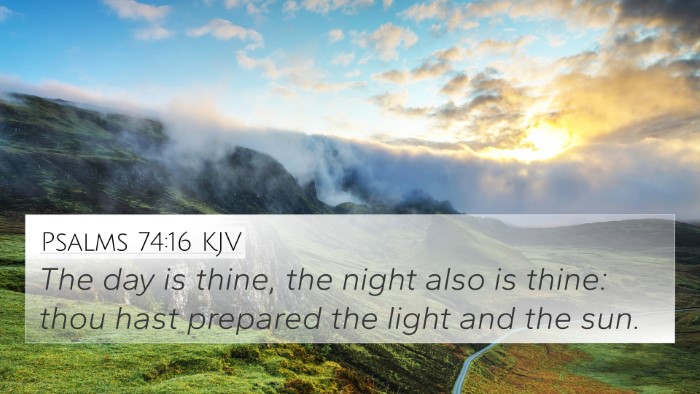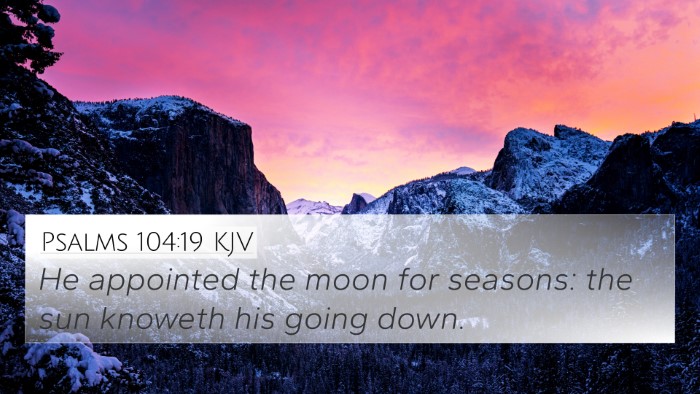Psalms 136:7 - Understanding the Meaning
Bible Verse: Psalms 136:7 - "To him that made great lights: for his mercy endureth forever."
This verse is situated within a psalm that emphasizes God's enduring mercy and His marvelous creations. In this concise exploration, we’ll delve into the insights gathered from public domain commentaries to shed light on its meaning, its thematic connections, and how it relates to other scriptures.
Summary of Psalms 136:7
This verse illustrates God's sovereignty and creative power, specifically focusing on the creation of great lights, referring to the sun and the moon. Matthew Henry notes that the “great lights” symbolize not just physical light but also spiritual illumination. The continual refrain of God's mercy serves as a reminder that all of creation testifies to His love and faithfulness.
Commentary Insights
-
Matthew Henry:
Henry explains that the creation of light is significant because it was a pivotal moment in the establishment of order and life. The assertion that "His mercy endureth forever" frames the verse as an expression of gratitude for God's ongoing care and the blessings of life.
-
Albert Barnes:
Barnes points out the contrast between the vastness of God's creation and the intimacy of His mercy. The “great lights” serve not only practical purposes but also reflect God's glory and presence in the world.
-
Adam Clarke:
Clarke emphasizes the poetic structure of the psalm, highlighting the repetitive praises that create an uplifting worship experience. The focus on “great lights” can also signify God's guidance through life’s uncertainties, further demonstrating His merciful nature.
Bible Cross References
This verse connects to several other scriptures, revealing thematic parallels and reinforcing the message of God's mercy and creation:
- Genesis 1:16: "And God made two great lights; the greater light to rule the day, and the lesser light to rule the night..." - The direct creation of the sun and moon is recounted here, illustrating God's role as Creator.
- Psalm 104:19: "He appointed the moon for seasons: the sun knoweth his going down." - This verse highlights the functional purpose of the lights created by God.
- Isaiah 40:26: "Lift up your eyes on high, and behold who hath created these things..." - A call to recognize God's power in creation, akin to the acknowledgment of mercy in Psalms 136.
- James 1:17: "Every good gift and every perfect gift is from above, and cometh down from the Father of lights..." - This New Testament reference connects God's creation to His goodness and ongoing provision.
- John 1:5: "And the light shineth in darkness; and the darkness comprehended it not." - Here, light symbolizes truth in a spiritual context, connecting to the theme of divine illumination as seen in Psalms 136:7.
- Matthew 5:14: "Ye are the light of the world..." - Believers are called to reflect the light that God created, linking themes of creation and mercy to human response.
- Revelation 21:23: "And the city had no need of the sun, neither of the moon, to shine in it: for the glory of God did lighten it..." - This final prophetic vision highlights God's eternal light that surpasses creation, echoing the enduring aspect of His mercy.
Thematic Bible Verse Connections
In exploring the themes presented in Psalms 136:7, we uncover profound layers of meaning regarding God's enduring nature and the beauty of creation. The concept of mercy is tightly woven throughout the Bible:
- Exodus 34:6: "The LORD, the LORD God, merciful and gracious..." - Here, God's character is unveiled explicitly as merciful and loving.
- Lamentations 3:22-23: "It is of the LORD's mercies that we are not consumed, because his compassions fail not. They are new every morning..." - This echoes the enduring mercy highlighted in Psalms 136.
- Romans 8:28: "And we know that all things work together for good to them that love God..." - Reflecting upon the interconnectedness of God’s plan, including creation and mercy.
Engaging with Psalms 136:7 through Cross-Referencing
To truly grasp the significance of this verse, readers are encouraged to engage in Bible cross-referencing. This involves:
- Utilizing Bible concordance tools to find related verses.
- Exploring Bible reference resources to establish connections between texts.
- Implementing cross-reference study methods to deepen understanding of Biblical themes.
- Considering how various verses amplify or reinterpret the central message of mercy and creation.
Conclusion
Psalms 136:7 serves as a reminder of God's creation and His persistent mercy. Through the analysis of various commentaries, cross-references, and thematic connections, we discern a cohesive narrative that speaks to the heart of both the Old and New Testaments. By participating in a cross-reference Bible study, we open pathways to deeper understanding and appreciation of the scriptures, seeing how one verse can illuminate the meaning of another. Remember, when navigating Biblical texts, create your chains of reference and note the threads that bind scripture together, revealing the consistent message of God's love and mercy.
